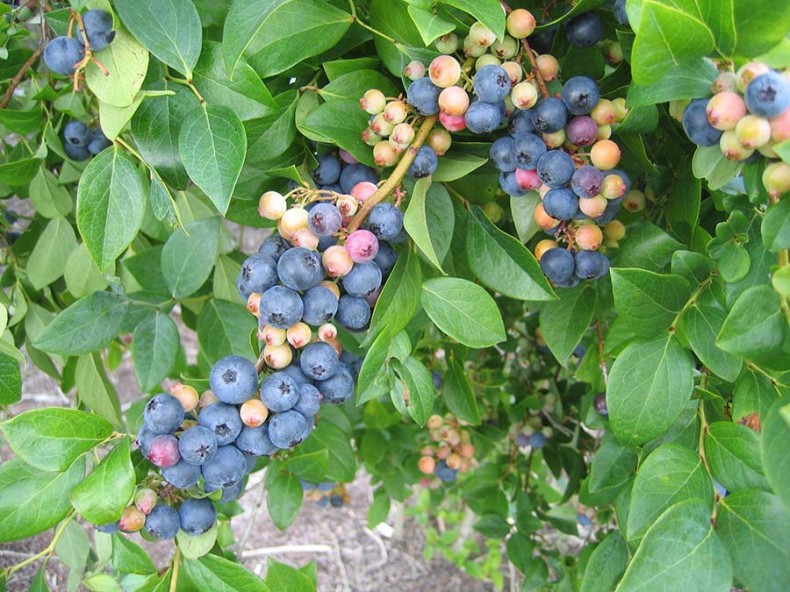Bountiful blueberries
Growing your own
By Carole HowellRabbiteye ‘Centurion’ blueberries are pink before they turn blue, reminiscent of the eye color of a white rabbit.
Blueberries, one of nature’s most powerful superfoods, could be within your reach, and right outside your back door. If you’re not yet enjoying fat, fresh-picked blueberries warmed by the sun and from your own garden, you can start now.
Blueberries love North Carolina as much as we love them, and are a beautiful addition to your landscaping, particularly in the spring with their delicate white flowers and in the fall with their brilliant red foliage.
Once established, blueberry bushes need very little care, but they do need a proper start.
Site preparation
“If you’ve got a site a blueberry likes, you can’t really grow a tomato plant or a vegetable garden,” said Bill Cline, extension specialist for NC State University, “That’s because while most plants prefer a neutral pH of around 7, blueberries love an acid soil, around a 4.5 pH.”
Look for a well-drained area in full sun, and prepare a spot by mixing the native soil with a generous amount of acidifying organic matter, such as pine bark mulch, to form a raised bed. Plan on placing plants about 5 or 6 feet apart.
Selection
Once your site is prepared, you’re ready to select your plants. “When I talk to folks pretty much anywhere in the state, I recommend the Rabbiteye species, because it works well in North Carolina’s wide range of soil types,” said Cline. Rabbiteye (Vaccinium ashei) types are so called because the berries are pink before they turn blue, reminiscent of the eye color of a white rabbit. They come with names like ‘Premier,’ ‘Powderblue,’ or ‘Tifblue.’ Plant more than one type for cross-pollination.
June is North Carolina Blueberry month. Celebrate at the Annual North Carolina Blueberry Festival, June 17–18, 2016, in downtown Burgaw. To learn more, ncblueberryfestival.com.
The number of plants you’ll need, of course, will depend on how you plan to use the fruit. Cline recommends five or six plants for the average family. “Just remember that birds love blueberries too, so it’s a good idea to plant with loss in mind.”
Bare root plants should be planted in late winter or early spring, while container grown plants will do fine planting in spring or fall.
For new plants, cut back half to ⅔ of the height at the time of planting. For potted plants, spread the root mass before planting.
Discourage fruit?
Yes, at first. This is an important tip: Many novice growers don’t know that you shouldn’t allow your plants to bear fruit for at least two years. Remove the flower buds to allow the plant to put all of its energy into healthy growth.
“That’s really hard for folks to do, because they’ll buy a plant and see all those flowers and start counting those blueberries,” said Cline. “But it will be really worth your effort to take the crop off with the idea that you have to grow a bush before you can have fruit. If you let them have too many berries at a young age, it will stunt or kill them.”
Care and maintenance
If your blueberry bush is happy with its soil, it needs very little fertilizer, said Cline. What it really needs is water in a moist, well-aerated soil, especially when the plants are young or during long dry stretches.
Established plants should be pruned to prevent overfruiting, maintain size and to remove dead or diseased branches. Netting your plants before they ripen may help prevent loss from hungry birds. Blueberry netting is relatively inexpensive, lasts several seasons, and is available at garden stores.
With the right soil and location, attention to watering, and pruning as needed, growing blueberries may be one of the easiest things you do all summer. Your final, but delicious, challenge will be to figure out how to enjoy all of those blueberries? Have fun finding out!
Pluck your fresh blueberries by the gallon or purchase by the pint at farms. Find out where at ncfarmfresh.com.
-
Share this story:





Comments (1)
Hal Shinn |
May 29, 2022 |
reply